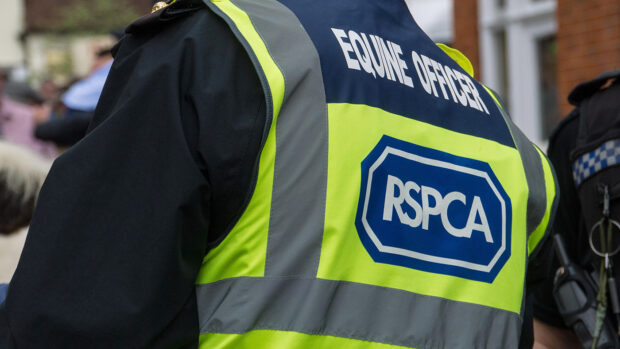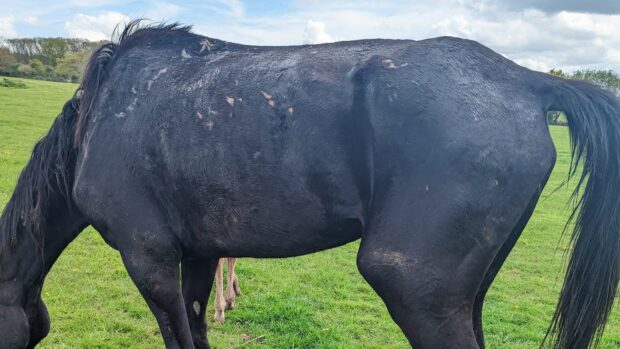Lack of turnout and a dearth of owners with appropriate experience are among the drivers of the current equine welfare crisis – as most horses’ needs are not being met.
The RSPCA has published Horse Sense, a comprehensive report commissioned by the charity and carried out by the University of Bristol, Human Behaviour Change for Life and University College Dublin.
The aim was to address the situation known as the “horse crisis” for years – and it found that although the original welfare issues have eased, “most equines in England and Wales are not having their welfare needs fully met”.
Welfare issues include lack of turnout, obesity, limited social interaction, “rough handling” and poor owner recognition of stress, pain and quality of life. The research indicated four key drivers (see below).
“We’re hoping to start the conversation with stakeholders about how we can work together to build a good life for horses,” RSPCA senior scientific manager for equines Mark Kennedy told H&H. “I think we all accept; the RSPCA certainly accepts, that horses are life-enhancing, and they bring an awful lot of people a lot of benefit and a lot of pleasure. It’s really important we all, in recognising that, work together and have an open and honest conversation about how we can ensure that we get a good life for horses. That’s the key thing.”
The term “horse crisis” was initially used by welfare charities in about 2012, owing to the number of equids needing charitable support since the financial crisis. But although the number of horses taken into RSPCA care has dropped to below 2013 figures, “many horses continue to suffer at the hands of their owners”, the report states.
The researchers gathered information from scientific and other literature, data from welfare charities, local authorities and equestrian organisations, as well as an online survey and investigation of horses for sale advertising.
It was found that the horse crisis, “originally rather loosely defined as over-breeding, over-population, neglect and abandonment, has eased, although it is not eliminated”.
“Rather, now, a diversity of equine welfare issues exists,” it states.
“Equine welfare is impacted by a complex, multi-faceted system… Unlike in 2012, it is not only horses used for particular disciplines, or particular breeds, or those owned by particular communities. Most equines in England and Wales, across all sectors of society, do not have the opportunity to experience a good quality of life.”
Lack of basic knowledge
The research found “a lack of basic knowledge and experience” in many people caring for horses; suggested reasons for this include the reduction in number of riding schools, and of opportunities for people to work on yards to gain experience, and issues in college training. It found this lack of knowledge can mean owners cannot read equine behaviour, so do not recognise stress, fear or pain.
It also found that many riders struggle to find yards offering turnout, or to access fields to rent, and a “strong theme of unintentional neglect” of horses, owing to inexperience, or lack of consideration of equine welfare in decision-making.
The report concludes that “the scale of change necessary to achieve a good life for equines should not be underestimated”.
“Tackling the equine welfare crisis such that all equines have the opportunity to experience a good quality of life requires strategic, radical change and is reliant upon legislative, policy, attitude and behaviour change with commitment from key partners and stakeholders to work in collaboration,” states the report, adding that action must be taken by local and national government, welfare charities, equestrian organisations, colleges – and all owners and keepers.
Dr Kennedy stressed that starting the conversation with all these stakeholders is key, and working towards practical solutions, such as protecting land for equine turnout, or looking into options where space is limited but horses can still access the three Fs – friends, freedom and forage – that are a necessity for good welfare. The RSPCA has also long advocated for animal welfare to be part of the national curriculum.
“We want to work together with welfare charities, and organisations; the British Horse Society, Pony Club, British Equestrian, to get us all talking about what parts of this report we can all work on to make a better life for horses,” he said. “Colleges are really important in terms of education, in horse care and knowledge, but also in practical skills of how to look after horses. And of course the ultimate stakeholders are the horses themselves.
“That’s why we want to start this conversation. We want people to read the report, think about it, and contact us. Then we can talk about how we can work together to put some of these recommendations into practice.”
Strengthening the bond
A spokesperson for the National Equine Welfare Council (NEWC) told H&H NEWC welcomes the report and “commends its focus on strengthening the horse-human relationship to improve equine welfare”.
She noted that the findings and recommendations align with those in the NEWC review of 2024. This highlighted that horses thrive if they have the three Fs, and “inadequate provision of these essentials leads to chronic stress and compromised welfare, mirroring the RSPCA’s findings that a lack of turnout, social interaction and appropriate nutrition are widespread welfare concerns”.
The NEWC report also looked at horse-human interactions, “revealing that many routine practices can inadvertently result in negative experiences for horses”.
“Both reports converge on the urgent need for systemic change across the equine sector,” the spokesperson said. “NEWC stands ready to work alongside the RSPCA and other stakeholders to implement these recommendations, advocating for evidence-based practices that pave the way towards a future where all horses experience a life worth living. Together, we can turn these insights into action, ensuring equine welfare is prioritised, understood, and safeguarded at all levels of human interaction.”
The key drivers
- A proliferation of horse keepers lacking in practical knowledge, skills and experience
- A mismatch of the supply and demand of certain equine types
- A lack of equine-keeping facilities with adequate provision for turnout, grazing and socialisation.
- A lack of provision for the lifetime welfare of all equines, including planning and careful decision-making from birth to death
- To stay up to date with all the breaking news from major shows throughout 2025, subscribe to the Horse & Hound website
You may also be interested in:

Riders think they know more than they do, research shows
‘This over-confidence can have serious consequences on the welfare of horses, and could affect the mental health of riders’

Many horses’ need are not being met, study finds, prompting calls to do better

‘Well intentioned but incompetent care’ means equines left to suffer

*Exclusive* Showing our love of horses – what we can all do to help secure equestrian sport’s future

Subscribe to Horse & Hound magazine today – and enjoy unlimited website access all year round





